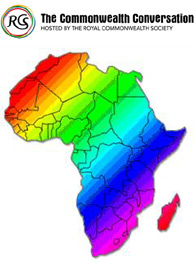Recent months have seen the issue of homosexuality being widely debated in various African member states of the Commonwealth. Uganda’s proposed ‘Anti-Homosexuality Bill 2009’, calling for the execution of ‘repeat homosexual offenders’, has been internationally condemned. Late last year, Rwanda came close to criminalising homosexuality for the first time when its penal code was being revised. Meanwhile, an engaged gay couple in Malawi were recently arrested and charged with ‘unnatural offences’. Is homophobia a real problem in the African Commonwealth, thus contradicting the high human-rights standards the association is supposed to uphold?
Below is a moving testimony from John, a Ugandan gay man:

Uganda is one of the African countries which treats its gay people worse than it treats even animals. Your family can disown you and they call you all sorts of names and sometimes the family can see you as curse. The police cannot protect you; even when you try to explain no- one listens. The only thing that can help here is money, which can make the police listen, but for how long? That’s the question. The public is also against gay people and this makes it hard as you have no-one to talk to and this makes the situation worse as you feel the whole world is against you. The government does not take any notice if you are alive or not, and they think you are worse than a pig, as they phrase it. When you are in prison you are beaten up by the prison officers and inmates. They can do all sorts of things and if you are a lesbian, they can let men rape you and if you are a gay man they push things inside you saying that this is what you want.
Gay people in Uganda are not allowed medical treatment and no one wants to help you as they think you can pass it on. Young gay people find it hard as they may not be allowed to go to school, their families disown them and there is no one to help; even if there is someone to help, they are scared because they will put their own life in danger. It’s hard to get a job in Uganda when you are gay, because no- one wants to employ you and, even if you have the money to start your own business, still no- one will come to get anything from you. To sum up, gay life in Uganda is so hard and as time goes on it becomes harder. I wish the Ugandan people could really understand that this is not something you copy from someone. I have never had any problems with anyone, and I have helped many people in need, but no- one can see that side of me because, when they know I’m gay, no one wants to know me any more. I wish I could change but I cannot, so I have to live in fear, with no family, just an isolated life. Hopefully one day the Ugandan people will open their eyes if they find a gay person in their families.
The Royal Commonwealth Society, the largest and oldest civil society organisation dedicated to the Commonwealth of Nations, is currently conducting the ‘Commonwealth Conversation’, the most extensive global public consultation ever held on the Commonwealth. Through a series of online discussions, opinion polls, expert meetings and public events, the aim is to stimulate debate on the role of the Commonwealth, its strengths and weaknesses, and its future direction. Two billion people, 54 countries, one conversation- join in!
